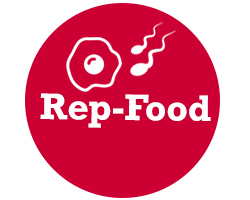REP-FOOD

REP-Food approaches the impact of dietary on reproduction and cellular development, with the aim of unravelling the role of specific food components in physiological and pathological states.
ESR3: Effect of dietary on mammalian spermatozoa membrane lipid remodeling
Nicola Bernabò, University of Teramo
Valentina Russo, University of Teramo
Augusto Carluccio, University of Teramo
Domenico Robbe, University of Teramo
Annamaria Cimini, University of L'Aquila
Rodolfo Ippoliti, University of L'Aquila
ESR 3
Effect of dietary on mammalian spermatozoa membrane lipid remodelling
Internal Tutor
External academic institution
Center for Neuroscience and Cell Biology - University of Coimbra
Tutor
Non-academic institution
Laboratorio di analisi Dr Fioroni s.r.l.
Supervisor
ESRs
Objectives, methods and topic interactions:
- To define effect of oxysterols on mammalian sperm functionality, membrane remodelling, mitochondrial function, oxidative stress, DNA integrity, and fertilization ability using either an in silico (biological networks-based computational modelling) or in vitro approach (flow cytometry, 2D electrophoresis, HPLC, mass spectrometry, confocal microscopy, IVF)(UniCo, UniPd, LF).
- To apply to these topics the technologies developed in ESR2 (lab on chip and to study the effect of oxidative stress on male gametes (integration with ESR4 and ESR6).
- In collaboration with ESR10 it will be investigated whether dietary interventions could affect the sirtuin expression profile in spermatozoa and in collaboration with ESR8 it will be analysed the effect of food supplementation on the reproductive activity of zebrafish.
ESR 5
Effects of dietary exposure to ochratoxin A (OTA) mycotoxin below/around guidance values on embryo/fetal development and pregnancy success
Internal Tutor
External academic institution
University of Bari "Aldo Moro"
Tutor
Non-academic institution
F.P.A. S.R.L. Fantini Professional Advice FPA
National Research Council Bari-ISPA-CNR
Supervisor
ESRs:
Objectives, methods and topic interactions:
- Correlation between OTA food contamination and its concentration in on reproductive performance in livestock animals (FPA);
- To define dose effect of OTA dietary contamination (ISPA-CNR) in farm animals on: a) in vivo embryo development and fetal annexa derived cells; b) in vitro on IVM/IVF derived early stage embryos and FAD-MSC derived lines (UniBa).
- To define the molecular and epigenetic effects of OTA on embryo/fetal development and FAD-MSC derived
- To verify an antimycotoxin effect of food-associated and intestinal microorganisms, in cooperation with ERS7. To these aims, pluripotency (expression of pluripotency, apoptosis and oxidative stress genes in the inner cell mass by qRT-PCR and immunostaining for protein distribution) and FAD-MSC lines proliferation and differentiation ability (expression of molecular and phenotypic biomarkers of specific lineages) will be assessed (UniU, Ugent).
ESR 11
Food habits, life style, genetic background in tumour initiation and progression of reproductive system
Internal Tutors
External academic institution
Tutor
Non-academic institution
Supervisor
ESR:
Objectives, methods and topic interactions:
- To understand the phases of tumour initiation and progression (tumour of reproductive system i.e. breast and ovarian cancer) linked to environmental stressors and food habits;
- To understanding of the biological assays for determining the cellular aspects of tumour initiation and progression;
- To understanding of the positive or negative effects of the different component of foods in relation to tumorigenesis (TU);
- Interactions with ESR8, in order to assay the effects of identified endocrine disruptors on tumour initiation and progression in breast and ovarian cancer (Dompé)
- Interactions with ESR1 in order to assess the effect of microencaspsulated olive oil on tumour cell proliferation and viability and with ESR2 to assay nanoparticles on different in vitro cellular systems.
Rep-Eat - H2020-MSCA-COFUND-2015
University of Teramo - Via Renato Balzarini 1 - 64100 - Teramo (TE) - Italy

REP_EAT MSCA Co-funding of regional, national and international programmes (COFUND) HORIZON 2020” – Grant Agreement N. 713714.CUP: C47B16000360007


